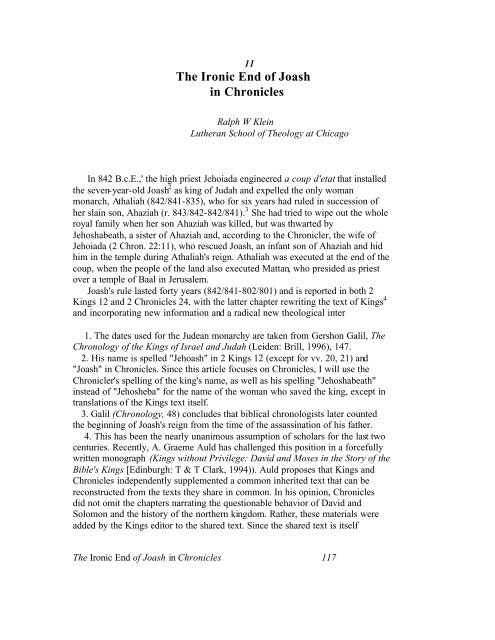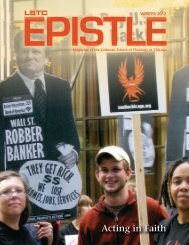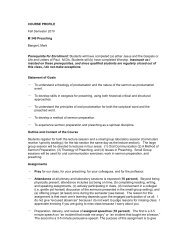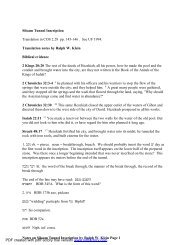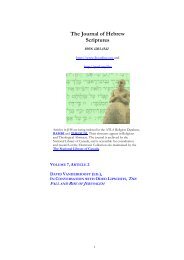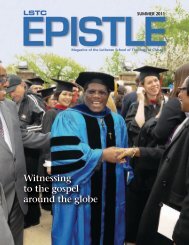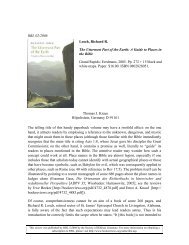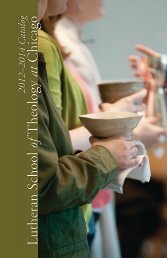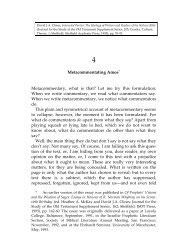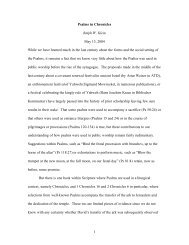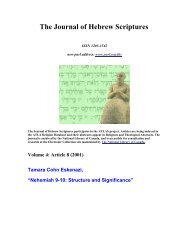The Ironic End of Joash in Chronicles - Fontes - Lutheran School of ...
The Ironic End of Joash in Chronicles - Fontes - Lutheran School of ...
The Ironic End of Joash in Chronicles - Fontes - Lutheran School of ...
Create successful ePaper yourself
Turn your PDF publications into a flip-book with our unique Google optimized e-Paper software.
11<strong>The</strong> <strong>Ironic</strong> <strong>End</strong> <strong>of</strong> <strong>Joash</strong><strong>in</strong> <strong>Chronicles</strong>Ralph W Kle<strong>in</strong><strong>Lutheran</strong> <strong>School</strong> <strong>of</strong> <strong>The</strong>ology at ChicagoIn 842 B.c.E.,' the high priest Jehoiada eng<strong>in</strong>eered a coup d'etat that <strong>in</strong>stalledthe seven-year-old <strong>Joash</strong> 2 as k<strong>in</strong>g <strong>of</strong> Judah and expelled the only womanmonarch, Athaliah (842/841-835), who for six years had ruled <strong>in</strong> succession <strong>of</strong>her sla<strong>in</strong> son, Ahaziah (r. 843/842-842/841). 3 She had tried to wipe out the wholeroyal family when her son Ahaziah was killed, but was thwarted byJehoshabeath, a sister <strong>of</strong> Ahaziah and, accord<strong>in</strong>g to the Chronicler, the wife <strong>of</strong>Jehoiada (2 Chron. 22:11), who rescued <strong>Joash</strong>, an <strong>in</strong>fant son <strong>of</strong> Ahaziah and hidhim <strong>in</strong> the temple dur<strong>in</strong>g Athaliah's reign. Athaliah was executed at the end <strong>of</strong> thecoup, when the people <strong>of</strong> the land also executed Mattan, who presided as priestover a temple <strong>of</strong> Baal <strong>in</strong> Jerusalem.<strong>Joash</strong>'s rule lasted forty years (842/841-802/801) and is reported <strong>in</strong> both 2K<strong>in</strong>gs 12 and 2 <strong>Chronicles</strong> 24, with the latter chapter rewrit<strong>in</strong>g the text <strong>of</strong> K<strong>in</strong>gs 4and <strong>in</strong>corporat<strong>in</strong>g new <strong>in</strong>formation and a radical new theological <strong>in</strong>ter1. <strong>The</strong> dates used for the Judean monarchy are taken from Gershon Galil, <strong>The</strong>Chronology <strong>of</strong> the K<strong>in</strong>gs <strong>of</strong> Israel and Judah (Leiden: Brill, 1996), 147.2. His name is spelled "Jehoash" <strong>in</strong> 2 K<strong>in</strong>gs 12 (except for vv. 20, 21) and"<strong>Joash</strong>" <strong>in</strong> <strong>Chronicles</strong>. S<strong>in</strong>ce this article focuses on <strong>Chronicles</strong>, I will use theChronicler's spell<strong>in</strong>g <strong>of</strong> the k<strong>in</strong>g's name, as well as his spell<strong>in</strong>g "Jehoshabeath"<strong>in</strong>stead <strong>of</strong> "Jehosheba" for the name <strong>of</strong> the woman who saved the k<strong>in</strong>g, except <strong>in</strong>translations <strong>of</strong> the K<strong>in</strong>gs text itself.3. Galil (Chronology, 48) concludes that biblical chronologists later countedthe beg<strong>in</strong>n<strong>in</strong>g <strong>of</strong> <strong>Joash</strong>'s reign from the time <strong>of</strong> the assass<strong>in</strong>ation <strong>of</strong> his father.4. This has been the nearly unanimous assumption <strong>of</strong> scholars for the last twocenturies. Recently, A. Graeme Auld has challenged this position <strong>in</strong> a forcefullywritten monograph (K<strong>in</strong>gs without Privilege: David and Moses <strong>in</strong> the Story <strong>of</strong> theBible's K<strong>in</strong>gs [Ed<strong>in</strong>burgh: T & T Clark, 1994)). Auld proposes that K<strong>in</strong>gs and<strong>Chronicles</strong> <strong>in</strong>dependently supplemented a common <strong>in</strong>herited text that can bereconstructed from the texts they share <strong>in</strong> common. In his op<strong>in</strong>ion, <strong>Chronicles</strong>did not omit the chapters narrat<strong>in</strong>g the questionable behavior <strong>of</strong> David andSolomon and the history <strong>of</strong> the northern k<strong>in</strong>gdom. Rather, these materials wereadded by the K<strong>in</strong>gs editor to the shared text. S<strong>in</strong>ce the shared text is itself<strong>The</strong> <strong>Ironic</strong> <strong>End</strong> <strong>of</strong> <strong>Joash</strong> <strong>in</strong> <strong>Chronicles</strong> 117
pretation <strong>of</strong> <strong>Joash</strong>'s life. This study, <strong>of</strong>fered <strong>in</strong> tribute to George W E. Nickelsburg, aclose friend and colleague for almost forty years, assesses the ways <strong>in</strong> which theChronicler has rewritten the story <strong>of</strong> <strong>Joash</strong> that he found <strong>in</strong> K<strong>in</strong>gs.<strong>The</strong> account <strong>of</strong> <strong>Joash</strong> <strong>in</strong> K<strong>in</strong>gs created theological problems for the Chronicler and hisstrict views on retribution, s<strong>in</strong>ce he expected bless<strong>in</strong>gs or punishments to happen <strong>in</strong> justproportion and with<strong>in</strong> a person's lifetime. He would have been surprised and even<strong>of</strong>fended by the idea that <strong>Joash</strong>'s successful efforts to repair the temple (2 K<strong>in</strong>gs 12:4-16)were followed immediately by an <strong>in</strong>vasion by Hazael <strong>of</strong> Aram, to whom <strong>Joash</strong> paid anenormous bribe (2 K<strong>in</strong>gs 12:17-18), and also by a palace conspiracy that led to theassass<strong>in</strong>ation <strong>of</strong> <strong>Joash</strong> himself (2 K<strong>in</strong>gs 12:19-21). <strong>The</strong> Chronicler used new <strong>in</strong>formationand a fresh <strong>in</strong>terpretation <strong>of</strong> the materials <strong>in</strong>herited from K<strong>in</strong>gs to provide a theologicallycoherent, if somewhat ironic, 5 account <strong>of</strong> the reign <strong>of</strong> <strong>Joash</strong>.2 K<strong>in</strong>gs 12''Jehoash was seven years oldwhen he became k<strong>in</strong>g. 2 1n the seventh year<strong>of</strong> Jehu, Jehoash became k<strong>in</strong>g, and he ruledforty years <strong>in</strong> Jerusalem. His mother's namewas Zibiah <strong>of</strong> Beer-sheba.'3 Jehoash did what was upright <strong>in</strong> Yahweh'ssight all his days because' Jehoiada thepriest taught him.Introduction2 Chron. 24 '<strong>Joash</strong> was seven years oldwhen he became k<strong>in</strong>g, and he ruled fortyyears <strong>in</strong> Jerusalem. His mother's name wasZibiah <strong>of</strong> Beer-sheba.2 <strong>Joash</strong> did what was upright <strong>in</strong> Yahweh'ssight all the days <strong>of</strong> Jehoiada the priest.4Only they did not remove the high places;the people were still sacrific<strong>in</strong>g andburn<strong>in</strong>g <strong>in</strong>cense on the high places.3 Jehoiada secured two wives for him, andhe engendered sons and daughters.I call attention to the follow<strong>in</strong>g significant changes <strong>in</strong>troduced by the Chronicler:postexilic, Auld attributes little historical credibility to the supplementary materials <strong>in</strong>K<strong>in</strong>gs and <strong>Chronicles</strong>, say<strong>in</strong>g, "I suspect <strong>in</strong> fact that this writer <strong>in</strong> K<strong>in</strong>gs knew next tonoth<strong>in</strong>g about many <strong>of</strong> these ancient k<strong>in</strong>gs <strong>of</strong> the north" (139). For reasons set forthbelow <strong>in</strong>n. 9, I do not believe that Auld has successfully overturned the consensus.5. For a discussion <strong>of</strong> irony <strong>in</strong> the text, see M. Patrick Graham, "Aspects <strong>of</strong> theStructure and Rhetoric <strong>of</strong> 2 <strong>Chronicles</strong> 25," <strong>in</strong> History and Interpretation: Essays <strong>in</strong>Honour <strong>of</strong> John H. Hayes (JSOTSup 173; Sheffield: Sheffield Academic Press, 1993),78-89.6. Second K<strong>in</strong>gs 11:21 <strong>in</strong> English versions. English versification, therefore, is one lessthan the MT throughout this chapter.7. <strong>The</strong> name <strong>of</strong> his mother is especially important, s<strong>in</strong>ce there may have been somesuspicion that the child brought forward by Jehoiada and Jehoshabeath was not really <strong>of</strong>the royal family. See even J. Maxwell Miller and John H. Hayes, A History <strong>of</strong> AncientIsrael and Judah (Philadelphia: Westm<strong>in</strong>ster, 1986), 303-5.
8. GKC 158b. Cf. Gen. 30:18; 31:49; 34:13; 1 K<strong>in</strong>gs 8:33.118 Ralph W Kle<strong>in</strong>1. <strong>The</strong> Chronicler omits the synchronism with the northern k<strong>in</strong>gdom as he doesthroughout his work.2. <strong>The</strong> Deuteronomistic Historian had affirmed that <strong>Joash</strong> was faithful throughout hislife, subject only to the limitation described <strong>in</strong> v. 4. <strong>The</strong> Chronicler, however, limitedthis fidelity to the lifetime <strong>of</strong> the priest Jehoiada and recorded the significantmisdeeds <strong>of</strong> <strong>Joash</strong> <strong>in</strong> vv. 17-22. <strong>The</strong>se faults provide a theological explanation forthe Aramaean <strong>in</strong>vasion (vv. 23-24) and the k<strong>in</strong>g's assass<strong>in</strong>ation (vv. 25-26).3. <strong>The</strong> limitation placed on <strong>Joash</strong>'s uprightness by 2 K<strong>in</strong>gs 12:4 was omitted by theChronicler, who has divided the life <strong>of</strong> <strong>Joash</strong> <strong>in</strong>to two periods, <strong>in</strong> the first <strong>of</strong> which,before the death <strong>of</strong> Jehoiada, the k<strong>in</strong>g was completely upright.'4. <strong>The</strong> additional <strong>in</strong>formation <strong>in</strong> <strong>Chronicles</strong> about <strong>Joash</strong>'s wives and children lo showsthat <strong>Joash</strong> lived under God's bless<strong>in</strong>g <strong>in</strong> the first period <strong>of</strong> his life and that his wives,s<strong>in</strong>ce chosen by the high priest himself, were permissible. S<strong>in</strong>ce Jehoiada chose onlytwo wives for the k<strong>in</strong>g, <strong>Joash</strong> <strong>in</strong> the Chronicler's eyes apparently did not transgressDeut. 17:17; two is hardly the "many wives" <strong>of</strong> which Deuteronomy warns. Whilesome scholars would attribute this <strong>in</strong>formation on <strong>Joash</strong>'s family to the source cited<strong>in</strong> v. 27, 11 it is important to note how general and vague this <strong>in</strong>formation is, reveal<strong>in</strong>gno detailed knowledge <strong>of</strong> the k<strong>in</strong>g's life. 129. <strong>The</strong> limitation on a k<strong>in</strong>g's righteousness by referr<strong>in</strong>g to ongo<strong>in</strong>g worship at highplaces is recorded for six k<strong>in</strong>gs <strong>in</strong> the Deuteronomic History. In two cases, the Chroniclerrepeats the <strong>in</strong>formation from K<strong>in</strong>gs (2 Chron. 14:17 // 2 K<strong>in</strong>gs 15:14 and 2 Chron. 20:33// 2 K<strong>in</strong>gs 22:43). <strong>The</strong> Chronicler's treatment <strong>of</strong> the other three passages, <strong>in</strong> addition to 2K<strong>in</strong>gs 12:4, seems also to be motivated by theological considerations. He omits thereference to high places under Amaziah (2 K<strong>in</strong>gs 14:4; cf. 2 Chron. 25:2) s<strong>in</strong>ce this k<strong>in</strong>g'slife, like <strong>Joash</strong>'s, was divided <strong>in</strong>to good and bad periods, with the bad period beg<strong>in</strong>n<strong>in</strong>g at2 Chron. 25:14. <strong>The</strong> reference to high places <strong>in</strong> the account <strong>of</strong> Azariah/ Uzziah (2 K<strong>in</strong>gs15:4; cf. 2 Chron. 26:3) was also omitted because <strong>of</strong> the Chronicler divid<strong>in</strong>g Uzziah's life<strong>in</strong>to good and bad periods. In the reign <strong>of</strong> Jotham (2 K<strong>in</strong>gs 15:35), the Chronicler rewrotethe verse as he compared the k<strong>in</strong>g to his father Uzziah: "Only he did not <strong>in</strong>vade thetemple <strong>of</strong> Yahweh, and still the people acted corruptly" (2 Chron. 27:2). <strong>The</strong> latter clauseis the Chronicler's recast<strong>in</strong>g <strong>of</strong> the reference to the high places. Auld, K<strong>in</strong>gs withoutPrivilege, 86-88, <strong>in</strong>terprets the four omissions by the Chronicler, <strong>in</strong> fact, as additions tothe shared text by the author <strong>of</strong> K<strong>in</strong>gs. I plan to publish <strong>in</strong> another context a completediscussion <strong>of</strong> Auld's <strong>in</strong>terpretation <strong>of</strong> the references to the high places, which heconsiders a "crucial illustration" <strong>of</strong> his case.
10. For children as a sign <strong>of</strong> bless<strong>in</strong>g see 1 Chron. 14:3-7 (David); 2 Chron. 11:18-23(Rehoboam); and 2 Chron. 13:21 (Abijah).11. Raymond B. Dillard, 2 <strong>Chronicles</strong> (WBC 15; Waco, Tex.: Word Books, 1987), 188.12. It is impossible to tell whether Jehoaddan <strong>of</strong> Jerusalem, the mother <strong>of</strong> <strong>Joash</strong>'s sonAmaziah (2 Chron. 25:1), was one <strong>of</strong> the two women picked by Jehoiada.1192 K<strong>in</strong>gs 12 2 <strong>Chronicles</strong> 244Afterwards <strong>Joash</strong> decided to renew thehouse <strong>of</strong> Yahweh.SAnd Jehoash said to the priests, "All thesilver <strong>of</strong> the votive gifts, which is broughtto the house <strong>of</strong> Yahweh - silver <strong>of</strong> thecensus tax, silver from the valuation <strong>of</strong>persons, or any silver that a person mayvoluntarily br<strong>in</strong>g to the house <strong>of</strong>Yahweh- 135 He gathered the priests and Levites andsaid to them, "Go out to the cities <strong>of</strong> Judahand gather from all Israel silver to repairthe house <strong>of</strong> your God, year by year; andyou shall act quickly <strong>in</strong> this matter." Butthe Levites did notact quickly. 146 let the priests take for themselves, eachfrom his benefactors, and let them repairthe damage to the house, wherever damagemay be found."7 1n the twenty-third year <strong>of</strong> K<strong>in</strong>gJehoash, the priests had not repaired thedamage to the house.eSo K<strong>in</strong>g Jehoash called to Jehoiada thepriest and to the other priests, and he saidto them, "Why have you not repaired thedamage to the house? Now, do not takesilver from your benefactors, but you shallgive it for the damage to the house."the k<strong>in</strong>g called to Jehoiada the chief, 15 andhe said to him, "Why have you not requiredthe Levites to br<strong>in</strong>g from Judah andJerusalem the tax required by Moses theservant <strong>of</strong> Yahweh and by the congregation<strong>of</strong> Israel for the tent <strong>of</strong> testimony?"
M e priests agreed not to take silver fromthe people, and not to repair the damage tothe house.10 Jehoiada the priest took a chest and boreda hole <strong>in</strong> its lid and put it on the south side<strong>of</strong> the altar, as one enters the house <strong>of</strong>Yahweh. <strong>The</strong> priests, the keepers <strong>of</strong> thethreshold, would put there all the silverbrought to the house <strong>of</strong> Yahweh.7 "As for Athaliah, that wicked woman, hersons have broken <strong>in</strong>to the house <strong>of</strong> God,and they have also given the votive gifts <strong>of</strong>the house <strong>of</strong> Yahweh to the Baals."8 <strong>The</strong> k<strong>in</strong>g gave orders that they shouldmake a chest and put it outside the gate <strong>of</strong>the house <strong>of</strong> Yahweh.9<strong>The</strong>y made a proclamation <strong>in</strong> Judah andJerusalem to br<strong>in</strong>g to Yahweh the taxrequired by Moses the servant <strong>of</strong> God forIsrael <strong>in</strong> the desert.13. <strong>The</strong> translation follows the suggestions <strong>of</strong> Mordechai Cogan and Hayim Tadmor, IIK<strong>in</strong>gs (AB 11; Garden City, N.Y: Doubleday, 1988), 137.14. H. G. M. Williamson (I and 2 <strong>Chronicles</strong> [New Century Bible Commentary; GrandRapids: Eerdmans, 19821, 320-21) proposes that vv. 5b-6 are secondary additions by apro-priestly redactor. For counterarguments, see Dillard, 2 <strong>Chronicles</strong>, 189-90, and SaraJaphet, I and II <strong>Chronicles</strong> (OTL; Louisville: Westm<strong>in</strong>ster/John Knox, 1993), 843. Japhetbelieves that the second occurrence <strong>of</strong> "Levites" <strong>in</strong> this verse refers to all members <strong>of</strong> thetribe, priests and Levites alike.15. Normally the lead<strong>in</strong>g priest is called "chief priest" <strong>in</strong> <strong>Chronicles</strong>. See v. 11 and 2Chron. 19:11 and 31:10.1202 K<strong>in</strong>gs 12 2 <strong>Chronicles</strong> 2410 And all the <strong>of</strong>ficials and all the peoplerejoiced, and they brought [the tax] andthrew it <strong>in</strong>to the chest until it was full."When they saw that there was much silver<strong>in</strong> the chest, the scribe <strong>of</strong> the k<strong>in</strong>g and thehigh priest would go up and bundle it upand count the money found <strong>in</strong> the house <strong>of</strong>Yahweh."Whenever someone brought the chest tothe k<strong>in</strong>g's <strong>of</strong>ficers by the hand <strong>of</strong> theLevites, when they saw that there wasmuch silver <strong>in</strong> it, the scribe <strong>of</strong> the k<strong>in</strong>g andthe <strong>of</strong>ficer <strong>of</strong> the chief priest would comeand empty the chest, take it, and return itto its place. So they did every day, andthey gathered much silver.
12 <strong>The</strong>y would put the silver which had beenweighed out <strong>in</strong>to the hands <strong>of</strong> the workmen<strong>in</strong> charge <strong>of</strong> the house <strong>of</strong> Yahweh, and theypaid it out to the carpenters and builderswork<strong>in</strong>g <strong>in</strong> the house <strong>of</strong> Yahweh,1 zAnd the k<strong>in</strong>g and Jehoiada gave it tothose who did have charge <strong>of</strong> the work <strong>of</strong>the house <strong>of</strong> Yahweh, and they hiredmasons and carpenters to renew the house<strong>of</strong> Yahweh, and also workers <strong>in</strong> iron andbronze to repair the house <strong>of</strong> Yahweh.1 3 and to the masons and the stone cutters,to buy timber and quarry stone to repair thedamage to the house <strong>of</strong> Yahweh, and for allthe expenses <strong>of</strong> the temple to repair it.13 Those who were engaged <strong>in</strong> the projectworked, and the repair<strong>in</strong>g progressed <strong>in</strong>their hands. <strong>The</strong>y restored the house <strong>of</strong>God to its proper condition, and theystrengthened it.14However, no silver bas<strong>in</strong>s, snuffers,spr<strong>in</strong>kl<strong>in</strong>g bowls or trumpets -any k<strong>in</strong>d <strong>of</strong>vessel <strong>of</strong> gold and silver-were made fromthe silver which was brought <strong>in</strong>to the house<strong>of</strong> Yahweh.14When they had f<strong>in</strong>ished, they broughtthe rest <strong>of</strong> the silver before the k<strong>in</strong>g, and hemade with it vessels for the house <strong>of</strong>Yahweh, both for the service and for theburnt <strong>of</strong>fer<strong>in</strong>gs, and ladles, and vessels <strong>of</strong>gold and silver. And they <strong>of</strong>fered burnt<strong>of</strong>fer<strong>in</strong>gs <strong>in</strong> the house <strong>of</strong> Yahweh regularlyall the days <strong>of</strong> Jehoiada.15 For they paid it to the workmen, andthey repaired the house with it.1 6<strong>The</strong>re was no account<strong>in</strong>g made with thepeople <strong>in</strong>to whose hands they put thesilver to pay the workmen, for they dealthonestly.17 Silver from guilt <strong>of</strong>fer<strong>in</strong>gs and s<strong>in</strong><strong>of</strong>fer<strong>in</strong>gs were not brought to the house <strong>of</strong>Yahweh, but it was for the priests.I call attention to the follow<strong>in</strong>g significant changes:1. <strong>The</strong> Chronicler adds a reference to the Levites <strong>in</strong> v. 5 and has <strong>Joash</strong> assign to them andto the priests the duty <strong>of</strong> actively collect<strong>in</strong>g money for the repair <strong>of</strong> the temple. <strong>The</strong>Chronicler also changes the collection to an annual event, perhaps reflect<strong>in</strong>g thecustoms <strong>of</strong> his time (see Neh. 10:33 [Eng. v. 32]). <strong>Joash</strong> criticized the Levites throughJehoiada for not collect<strong>in</strong>g the funds rapidly enough. He also <strong>in</strong>terpreted this collection
as a tax legislated by Moses orig<strong>in</strong>ally for the tabernacle (Exod. 30:11-16; 38:25-26) butnow121due to the temple as well. <strong>The</strong> need for repairs is laid at the feet <strong>of</strong> Athaliah and hersons 16 <strong>in</strong> v. 7, who are accused <strong>of</strong> break<strong>in</strong>g <strong>in</strong>to the temple and us<strong>in</strong>g its votive giftsfor the Baals. <strong>The</strong> damage to the temple was not due to negligence by the clergy. InK<strong>in</strong>gs, on the other hand, <strong>Joash</strong> had asked the priests to provide funds for repair <strong>of</strong> thetemple from their own regular <strong>in</strong>come, and he discovered that no repairs to the templehad been made after twenty-three years! He then reprimanded Jehoiada for notrepair<strong>in</strong>g the house and ruled that the priests would receive no more money directly,although they would not be required to f<strong>in</strong>ance repairs to the temple.2. In K<strong>in</strong>gs, <strong>Joash</strong> proposed that the contributions be deposited <strong>in</strong> a chest he placed <strong>in</strong>the temple, thus avoid<strong>in</strong>g the priests as <strong>in</strong>termediaries. One <strong>of</strong> the k<strong>in</strong>g's <strong>of</strong>ficials andthe high priest 17 would count the money and turn it over to those supervis<strong>in</strong>g therepairs <strong>in</strong> the temple. Cultic utensils did not have to be f<strong>in</strong>anced from these funds, andthe priests were provided with restricted <strong>in</strong>come from the guilt and s<strong>in</strong> <strong>of</strong>fer<strong>in</strong>gs. <strong>The</strong>Chronicler moved the chest outside the gate <strong>of</strong> the temple where laypeople coulddeposit their money directly and not violate the hol<strong>in</strong>ess <strong>of</strong> the sanctuary. <strong>The</strong>proclamation reported <strong>in</strong> 2 Chron. 24:9 may reflect a communication strategy fromthe Persian period (cf. 2 Chron. 30:5; 36:22; Ezra 1:1; 10:7; Neh. 8:10). 18 In anycase, the people joyfully paid this tax <strong>in</strong> great amounts, thus sett<strong>in</strong>g an example forthe Chronicler's audience. Both the k<strong>in</strong>g and the high priest <strong>in</strong> <strong>Chronicles</strong> arerepresented by an <strong>of</strong>ficial <strong>in</strong> the count<strong>in</strong>g <strong>of</strong> the money, correct<strong>in</strong>g an impressionfrom K<strong>in</strong>gs that the high priest and the scribe <strong>of</strong> the k<strong>in</strong>g were equal <strong>in</strong> rank. In<strong>Chronicles</strong> the high priest is roughly equal to the k<strong>in</strong>g himself. Excess funds gatheredfrom the people were used to f<strong>in</strong>ance or provide raw material for cultic vessels - <strong>in</strong>direct contradiction to K<strong>in</strong>gs. <strong>The</strong> existence <strong>of</strong> such surplus silver emphasizes the size<strong>of</strong> the people's gifts. S<strong>in</strong>ce there were no longer k<strong>in</strong>gs to provide these cultic vesselsafter the exile, the Chronicler may be provid<strong>in</strong>g an etiology for the provision <strong>of</strong> culticvessels <strong>in</strong> his own time. 1916. Athaliah had attempted to wipe out the royal family (2 Chron. 22:10), and variousmembers <strong>of</strong> the family had been killed <strong>in</strong> earlier <strong>in</strong>cidents (2 Chron. 21:4; 22:1). Perhapsthe term "sons" here should be understood as her "adherents."17. This may <strong>in</strong>dicate mutual suspicion between the k<strong>in</strong>g and the priesthood that couldonly be assuaged by their count<strong>in</strong>g the funds together. On the other hand, there is norequired accountability for those supervis<strong>in</strong>g the repair work. Cf. 2 K<strong>in</strong>gs 22:7 // 2 Chron.34:12. <strong>The</strong> contractors were trusted more than the priests!18. See Michael Fishbane, Biblical Interpretation <strong>in</strong> Ancient Israel (Oxford: ClarendonPress, 1985), 159.19. Wilhelm Rudolph, Chronikbacher (HAT 21; Tub<strong>in</strong>gen: Mohr [Siebeck], 1955), 277.
122 Ralph W Kle<strong>in</strong>Jehoiada's Death and Burial15 Jehoiada grew old and full <strong>of</strong> days, and he died. He was 130 years old at hisdeath.16 <strong>The</strong>y buried him <strong>in</strong> the city <strong>of</strong> David with the k<strong>in</strong>gs, for he had done good <strong>in</strong>Israel and toward God and his house.<strong>The</strong> next three paragraphs, vv. 15-22, which are conta<strong>in</strong>ed only <strong>in</strong> <strong>Chronicles</strong>, providethe theological rationale for the defeat and assass<strong>in</strong>ation <strong>of</strong> <strong>Joash</strong>. <strong>The</strong> Chronicler givesfull honors to Jehoiada by credit<strong>in</strong>g him with a life as long as Jacob's (Gen. 47:9) andsimilar to that <strong>of</strong> other patriarchs, matriarchs, and heroes <strong>of</strong> the faith. 20 Jehoiada hadbenefited Israel by restor<strong>in</strong>g <strong>Joash</strong> to the throne, perhaps also serv<strong>in</strong>g as regent dur<strong>in</strong>g hismonarchy, and he had assisted God by repair<strong>in</strong>g the house. This is the only time theChronicler reports the death and burial <strong>of</strong> someone other than a k<strong>in</strong>g. Jehoiada's burialwith the k<strong>in</strong>gs is a better fate than that <strong>of</strong> <strong>Joash</strong> (v. 25). With the death <strong>of</strong> Jehoiada,<strong>Joash</strong>'s conduct and his fate turn from good to bad (cf. v. 2).Transgression17 After the death <strong>of</strong> Jehoiada, the <strong>of</strong>ficials <strong>of</strong> Judah came and paid homage to thek<strong>in</strong>g. <strong>The</strong>n the k<strong>in</strong>g hearkened to them. 18 <strong>The</strong>y abandoned the house <strong>of</strong> Yahweh, theGod <strong>of</strong> their ancestors, and worshiped the Asherim and the idols. Consequentlythe wrath <strong>of</strong> Yahweh was on Judah and Jerusalem on account <strong>of</strong> this guilt.<strong>Joash</strong> listened to bad advisers, as had Rehoboam (2 Chron. 10:8-11), Ahab andJehoshaphat (2 Chron. 18:4-11), and Ahaziah, whose mother Athaliah was his counselor(2 Chron. 22:3-4). K<strong>in</strong>g and people together turned from the worship <strong>of</strong> Yahweh toAsherim (cf. the apostasy <strong>of</strong> Asa's mother <strong>in</strong> 2 Chron. 15:16 and <strong>of</strong> Manasseh <strong>in</strong> 2 Chron.33:3, 19) and idols (cf. the Philist<strong>in</strong>es, who sent news <strong>of</strong> Saul's death to their idols [1Chron. 10:9]). <strong>The</strong> div<strong>in</strong>e wrath for these <strong>of</strong>fenses was manifested <strong>in</strong> the <strong>in</strong>vasion <strong>of</strong> theArameans <strong>in</strong> vv. 23-24.Prophetic Warn<strong>in</strong>gs and Royal Murder19 He sent prophets among them to br<strong>in</strong>g them back to Yahweh. <strong>The</strong>y warned them,but they did not give heed. 20 <strong>The</strong>n the spirit <strong>of</strong> God clothed itself with Zechariah,the son <strong>of</strong> Jehoiada the priest. He stood above the people and said to them, "Thussays God: Why are you transgress<strong>in</strong>g the commandments <strong>of</strong> Yahweh? You will notprosper. S<strong>in</strong>ce you have abandoned Yahweh, he has abandoned you." 21 <strong>The</strong>y con20. Sarah, 127; Aaron, 123; Moses, 120; Joseph and Joshua, 110. Historically, <strong>of</strong>course, Jehoiada's age seems unlikely because <strong>of</strong> general life expectancy and the agedifferential with his wife. Jehoshabeath was probably not much more than twenty at thedeath <strong>of</strong> her father Jehoram, who died when he was forty (2 Chron. 21:5). Ahaziah ruledfor one year and Athaliah for six. Hence she would have been no more than twenty-sevenat the time <strong>of</strong> the coup. Even if Jehoiada lived until two years before the death <strong>of</strong> <strong>Joash</strong>,he would have been sixty-five years older than his wife! Dillard (2 <strong>Chronicles</strong>, 192) is not
will<strong>in</strong>g to preclude 130 as an accurate figure.spired aga<strong>in</strong>st him and stoned him with stones, follow<strong>in</strong>g the commandment <strong>of</strong> thek<strong>in</strong>g, <strong>in</strong> the court <strong>of</strong> the house <strong>of</strong> Yahweh. 22 <strong>Joash</strong> the k<strong>in</strong>g did not remember theloyalty that Jehoiada his father had shown to him, and so he killed his son. As hedied, he said, "May Yahweh see and avenge!"<strong>The</strong> guilt is shared by k<strong>in</strong>g and people alike; both refused to listen to prophets sent byGod just as both had practiced idolatry. Zechariah was endowed with prophetic powers (1Chron. 12:19; 2 Chron. 15:1) and delivered a speech which reflects the Chronicler's owntheology through and through. Prosper<strong>in</strong>g (or lack <strong>of</strong> it) is a typical reward (punishment)for good conduct (misconduct) <strong>in</strong> <strong>Chronicles</strong>, and the Chronicler notes elsewhere thatabandon<strong>in</strong>g Yahweh leads to div<strong>in</strong>e abandonment <strong>of</strong> the s<strong>in</strong>ners (2 Chron. 12:5). A mobstoned Zechariah, on the k<strong>in</strong>g's orders. Thus, the son <strong>of</strong> the man who had made <strong>Joash</strong>k<strong>in</strong>g was executed at <strong>Joash</strong>'s <strong>in</strong>itiative, and the deed took place <strong>in</strong> the temple courts. At<strong>Joash</strong>'s own coronation, his supporters had taken care to get Athaliah out <strong>of</strong> the templeand <strong>in</strong>to the palace before they killed her. Zechariah's request for vengeance is answered<strong>in</strong> vv. 23-26.While the report about the group <strong>of</strong> prophets and the speech <strong>of</strong> Zechariah may be thecontribution <strong>of</strong> the Chronicler's own pen, the specific identity <strong>of</strong> Zechariah and hisviolent death may have come to the Chronicler from another source, perhaps the onementioned <strong>in</strong> v. 27. A recent <strong>in</strong>scription may also attest to the historicity <strong>of</strong> Zechariah, theson <strong>of</strong> Jehoiada: 21 "Just as Ashyahu [<strong>Joash</strong>] 22 commanded you to give by the hand <strong>of</strong>Zechariah silver <strong>of</strong> Tarshish to the house <strong>of</strong> -Yahweh. Three sheqels." Though the nameZechariah is very common, his connection here with <strong>Joash</strong> and with fund-rais<strong>in</strong>g for thetemple seems more than a co<strong>in</strong>cidence.<strong>The</strong> royal hostility toward Zechariah and the priests is anticipated <strong>in</strong> the Book <strong>of</strong> K<strong>in</strong>gs,when <strong>Joash</strong> criticized Jehoiada and the priests for not repair<strong>in</strong>g the temple and when<strong>Joash</strong> raided the temple to buy <strong>of</strong>f Hazael.<strong>The</strong> Aramaean Attack2 K<strong>in</strong>gs 12 2 <strong>Chronicles</strong> 2418 <strong>The</strong>n Hazael the k<strong>in</strong>g <strong>of</strong> Aram came up23 At the turn <strong>of</strong> the year, 23 an army hostand fought aga<strong>in</strong>st Gath and took it. Arid came up aga<strong>in</strong>st him. <strong>The</strong>y came to JudahHazael set his face to go up aga<strong>in</strong>st and Jerusalem and destroyed allJerusalem.the <strong>of</strong>ficials <strong>of</strong> the people from among thepeople, and all their spoil he sent to thek<strong>in</strong>g <strong>of</strong> Damascus.21. This was proposed by P Kyle McCarter, Jr., at the Annual Meet<strong>in</strong>g <strong>of</strong> the Society <strong>of</strong>Biblical Literature, San Francisco, November 1997.22. Other names are attested <strong>in</strong> which the div<strong>in</strong>e name appears <strong>in</strong> both the second andfirst position: Coniah and Jehoiach<strong>in</strong>.
Z 0 <strong>The</strong> rest <strong>of</strong> the acts <strong>of</strong><strong>Joash</strong> and all that hedid, are they not written<strong>in</strong> the Book <strong>of</strong>the Annals <strong>of</strong> the K<strong>in</strong>gs <strong>of</strong> Judah?"His servants rose up and <strong>in</strong>itiated aconspiracy aga<strong>in</strong>st him, and they smote25 When they went away from him, leav<strong>in</strong>ghim severely wounded, his servants24. Williamson (1 and 2 <strong>Chronicles</strong>, 325) believes that the Chronicler was dependent onan extrabiblical source for his version <strong>of</strong> the Aramaean War, but Japhet (I and II<strong>Chronicles</strong>, 851-52) argues conv<strong>in</strong>c<strong>in</strong>gly that the Chronicler modeled this account on hisown narrative about Shishak's campaign (2 Chron. 12:2-12).125conspired aga<strong>in</strong>st him because <strong>of</strong> theviolence done to the son 26 <strong>of</strong> Jehoiada thepriest, and they killed him on his bed. <strong>The</strong>yburied him <strong>in</strong> the city <strong>of</strong> David, but theydid not bury him with the k<strong>in</strong>gs.22 1t was Jozabad 21 the son <strong>of</strong> Shimeath andJehozabad son <strong>of</strong> Shomer, his servants,who struck him down so that he died. <strong>The</strong>yburied him with his fathers <strong>in</strong> the city <strong>of</strong>David. Amaziah his son ruled <strong>in</strong> his stead.26 <strong>The</strong>se are the ones who conspired aga<strong>in</strong>sthim: Zabad the son <strong>of</strong> Shimeath theAmmonitess and Jehozabad the son <strong>of</strong>Shimrith the Moabitess.27 As for his sons, the abundance <strong>of</strong> oraclesaga<strong>in</strong>st him, and the rebuild<strong>in</strong>g <strong>of</strong> thehouse <strong>of</strong> God, behold they are written <strong>in</strong>the Midrash <strong>of</strong> the Book <strong>of</strong> K<strong>in</strong>gs.Amaziah his son ruled <strong>in</strong> his stead.<strong>The</strong> respective conclud<strong>in</strong>g summaries <strong>in</strong> vv. 20 and 27 <strong>of</strong> K<strong>in</strong>gs and <strong>Chronicles</strong> areworded differently and have a divergent location, one before and one after the death <strong>of</strong>
<strong>Joash</strong>." It is unclear whether the Midrash <strong>of</strong> the Book <strong>of</strong> K<strong>in</strong>gs (<strong>Chronicles</strong>) conta<strong>in</strong>edadditional oracles about <strong>Joash</strong> or whether "the abundance <strong>of</strong> oracles" <strong>in</strong> v. 27 is only areference back to v. 19. <strong>The</strong> assass<strong>in</strong>ation <strong>of</strong> <strong>Joash</strong> <strong>in</strong> K<strong>in</strong>gs takes place without anadequate explanation; <strong>in</strong> <strong>Chronicles</strong> it follows his submission to the <strong>of</strong>ficials <strong>of</strong> Judahwith the resultant turn to idolatry, his failure to listen to the prophets, his complicity <strong>in</strong>the execution <strong>of</strong> Zechariah, and his defeat by the Aramaean army. In fact, that defeat,accord<strong>in</strong>g to <strong>Chronicles</strong>, left him wounded, and his servants conspired aga<strong>in</strong>st him <strong>in</strong>response to his violence .aga<strong>in</strong>st Zechariah - the priest-prophet's f<strong>in</strong>al prayer forvengeance is granted. <strong>The</strong> conspiracy aga<strong>in</strong>st <strong>Joash</strong> <strong>of</strong>fers a k<strong>in</strong>d <strong>of</strong> poetic justice s<strong>in</strong>ce<strong>Joash</strong> had been <strong>in</strong>volved <strong>in</strong> the conspiracy aga<strong>in</strong>st Zechariah. <strong>The</strong> Chronicler gives adifferent location for the k<strong>in</strong>g's death (on his bed <strong>in</strong>stead <strong>of</strong> <strong>in</strong> the Beth Millo), either25. "Silla" may be a corrupt variant <strong>of</strong> Millo. Its <strong>in</strong>clusion <strong>in</strong> the text required theaddition <strong>of</strong> "which goes down to."26. LXX, Vulgate, MT use the plural form.27. "Jozacar" is attested <strong>in</strong> many Hebrew manuscripts and may be orig<strong>in</strong>al, although<strong>Chronicles</strong> was us<strong>in</strong>g a text with the Jozabad variant. <strong>The</strong> "Jo-" prefix is absent <strong>in</strong><strong>Chronicles</strong> due to haplography (cf. the suffix on the preced<strong>in</strong>g word).28. In a discussion on the death <strong>of</strong> Josiah, H. G. M. Williamson ("Reliv<strong>in</strong>g the Death <strong>of</strong>Josiah," VT 37 [19871: 12) argued that the Chronicler must have had a different edition<strong>of</strong> the Deuteronomic History, s<strong>in</strong>ce he places the source citation at a different positionthan <strong>in</strong> K<strong>in</strong>gs MT and the Chronicler is not known to move such citations from theirposition <strong>in</strong> his Vorlage (cf. 2 Chron. 35:26-27 and 2 K<strong>in</strong>gs 23:28). He considers this thedecisive argument <strong>in</strong> his discussion with Christopher Begg about whether <strong>Chronicles</strong>knew an alternate form <strong>of</strong> the Deuteronomic History. He mentions 2 Chron. 16:11; 2Chron. 20:34; and 2 Chron. 25:26 as places where <strong>Chronicles</strong> follows the unusualplacement <strong>of</strong> the formulae <strong>in</strong> K<strong>in</strong>gs. Perhaps 2 Chron. 24:27 is a second case, <strong>in</strong> additionto Josiah, <strong>in</strong> which the Chronicler <strong>in</strong> fact moved the source citation found <strong>in</strong> his Vorlage.126 Ralph W Kle<strong>in</strong>because he did not understand the reference <strong>in</strong> K<strong>in</strong>gs or because he was draw<strong>in</strong>g acontrast with <strong>Joash</strong>'s early life when he was hidden <strong>in</strong> a bedroom <strong>of</strong> the temple (seebelow). Both K<strong>in</strong>gs and <strong>Chronicles</strong> report his burial <strong>in</strong> the city <strong>of</strong> David, but <strong>Chronicles</strong>adds that it was not with the other k<strong>in</strong>gs - <strong>in</strong> po<strong>in</strong>ted contrast to the burial place <strong>of</strong>Jehoiada. 29K<strong>in</strong>gs provides the names <strong>of</strong> the conspirators and the names <strong>of</strong> their fathers. Build<strong>in</strong>gon the fem<strong>in</strong><strong>in</strong>e taw end<strong>in</strong>g on Shimeath, and add<strong>in</strong>g a taw to the parent <strong>of</strong> Jehozabad aswell, the Chronicler <strong>in</strong>terpreted both words as mothers' names and connected them toAmmon and Moab, respectively. Graham has noted the presence <strong>of</strong> two men namedJehozabad and three named Zabad <strong>in</strong> Ezra 10 and suggested that the hostility toward theAmmonites and Moabites <strong>in</strong> Ezra 9:1 may have led to the <strong>in</strong>clusion <strong>of</strong> these Gentiles <strong>in</strong> 2Chron. 24:26 as well. 30 Ackroyd has remarked that those who had turned to alien deitieswere punished by alien <strong>in</strong>struments <strong>of</strong> div<strong>in</strong>e wrath. 31
<strong>The</strong> Irony <strong>of</strong> It All<strong>The</strong> additional material and the theological <strong>in</strong>terpretation <strong>in</strong>troduced by the Chroniclerlend a poignant tone to the account <strong>of</strong> <strong>Joash</strong> <strong>in</strong> <strong>Chronicles</strong>. <strong>The</strong>se ironic items <strong>in</strong>clude:1. Jehoiada and Jehoshabeath saved the life <strong>of</strong> <strong>Joash</strong> and put him on his throne, but<strong>Joash</strong> was implicated <strong>in</strong> the murder <strong>of</strong> their 32 son Zechariah. By the same tokenZechariah was probably among the sons <strong>of</strong> Jehoiada who ano<strong>in</strong>ted <strong>Joash</strong> (2 Chron.23:11).2. At the command <strong>of</strong> the k<strong>in</strong>g, 33 people conspired aga<strong>in</strong>st Zechariah and killed him (2Chron. 24:21), but <strong>Joash</strong>'s own servants conspired aga<strong>in</strong>st him because <strong>of</strong> theviolence done to the son(s) <strong>of</strong> Jehoiada. Both the bad Athaliah (2 Chron. 23:13) andthe good <strong>Joash</strong> died by treason/conspiracy.3. Zechariah was murdered <strong>in</strong> the same temple where <strong>Joash</strong> had been protected dur<strong>in</strong>gthe reign <strong>of</strong> Athaliah. Those who had crowned <strong>Joash</strong> carefully removed Athaliahfrom the temple before kill<strong>in</strong>g her.29. Other k<strong>in</strong>gs to be given less than fully honorable burials <strong>in</strong> <strong>Chronicles</strong> are Asa (2Chron. 16:14), Jehoram (2 Chron. 21:19-20), Uzziah (2 Chron. 26:23), and Ahaz (2Chron. 28:27).30. M. Patrick Graham, "A Connection Proposed Between II Chr 24,26 and Ezra 9-10,"ZAW 97 (1985): 256-58. Japhet (I and II <strong>Chronicles</strong>, 854), on the other hand, believesthat the <strong>in</strong>formation on the ethnic background <strong>of</strong> the assass<strong>in</strong>s was found <strong>in</strong> theChronicler's source and subsequently omitted <strong>in</strong> K<strong>in</strong>gs.31. Peter R. Ackroyd, I & II <strong>Chronicles</strong>, Ezra, Nehemiah (Torch Bible Commentaries;London: SCM, 1973), 161.32. Jehoshabeath is never called the mother <strong>of</strong> Zechariah, but priests would not havehad multiple wives.33. <strong>The</strong>se same people transgressed the commandments <strong>of</strong> Yahweh (24:20).4. Jehoiada, the glorified high priest, is buried with the k<strong>in</strong>gs; <strong>Joash</strong>, the k<strong>in</strong>g whose lifeturned from good to bad, is not buried with the k<strong>in</strong>gs.5. Worshipers turn from one deity to another. <strong>The</strong> sons <strong>of</strong> Athaliah used the votive gifts<strong>of</strong> the house <strong>of</strong> Yahweh for the Baals (2 Chron. 24:7). Subsequently, the peoplelooted the Baal temple and killed Mattan, its priest. At the end, <strong>Joash</strong> himself and thepeople worshiped Asherim and idols (2 Chron. 24:28).6. Jehoshabeath hid <strong>Joash</strong> and his nurse <strong>in</strong> a bedroom <strong>of</strong> the temple (22:11); <strong>Joash</strong>'sservants killed him on his own bed (24:25).7. <strong>Joash</strong> did not remember the loyalty <strong>of</strong> Jehoiada and killed Zechariah his son; thename Zechariah means "Yahweh has remembered."8. <strong>Joash</strong> listened to the <strong>of</strong>ficers <strong>of</strong> Judah and fell <strong>in</strong>to s<strong>in</strong>, but he and the people wouldnot listen to the warn<strong>in</strong>gs <strong>of</strong> the prophets.'<strong>The</strong> net effect <strong>of</strong> these ironic twists is to show the <strong>in</strong>gratitude <strong>of</strong> <strong>Joash</strong> toward Jehoiadaand his irresponsibility <strong>in</strong> lead<strong>in</strong>g the people. In several ways he even repeated the<strong>of</strong>fenses <strong>of</strong> Athaliah. In recast<strong>in</strong>g 2 K<strong>in</strong>gs 12 the Chronicler provides a coherenttheological and historiographical account <strong>of</strong> <strong>Joash</strong> and summons his readers to loyalty to127
Yahweh and to his temple.34. <strong>The</strong> verbs are synonyms <strong>in</strong> Hebrew.


